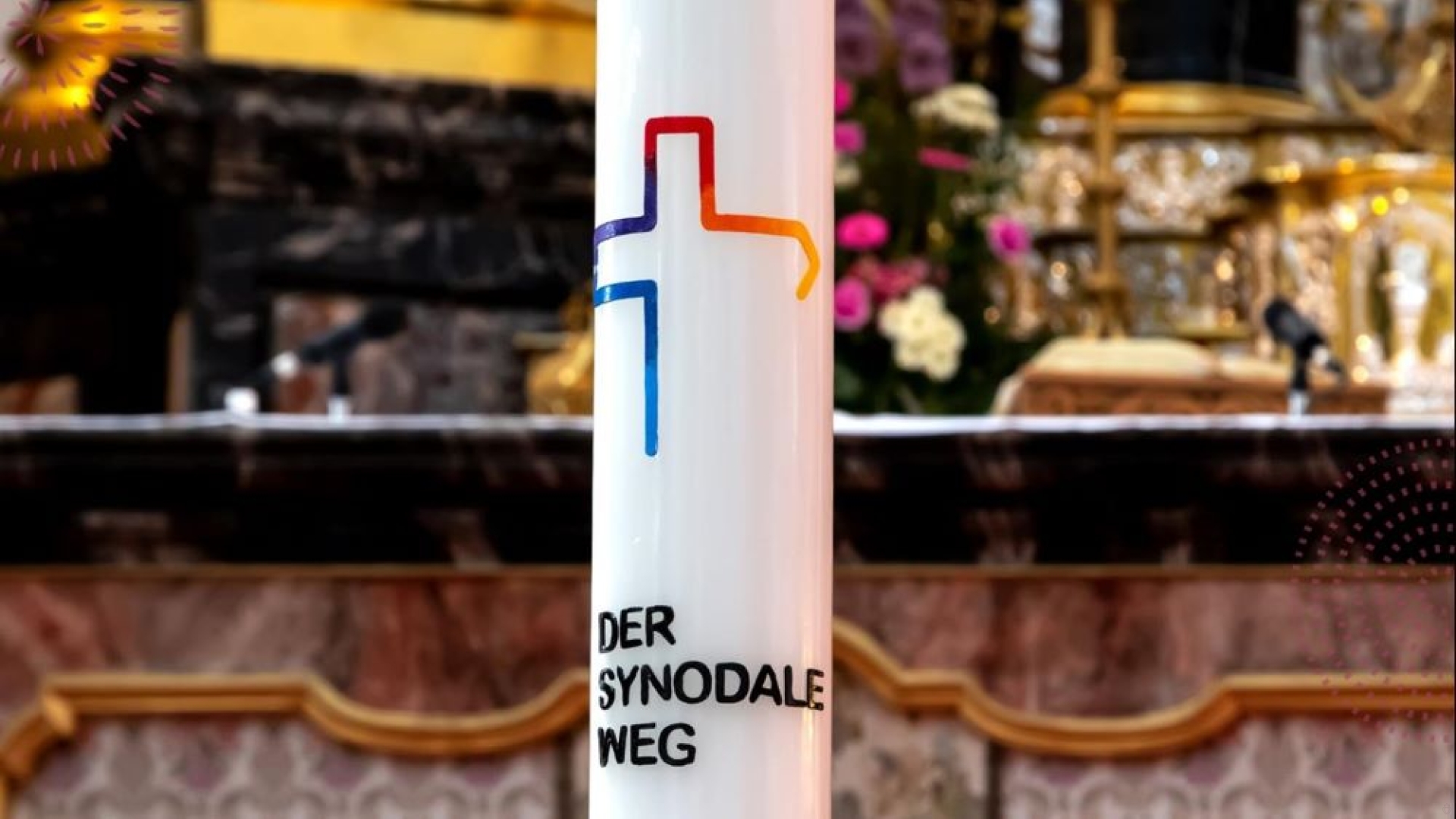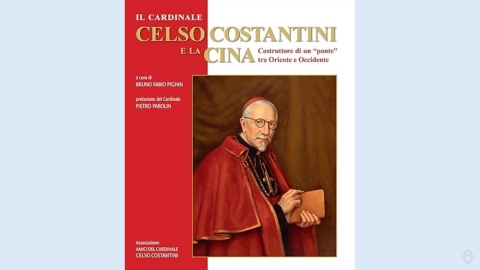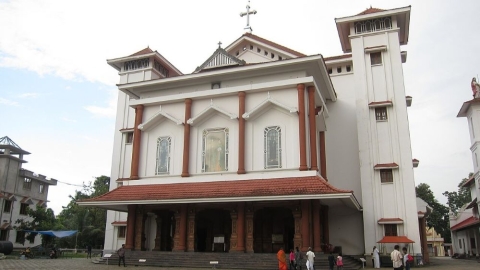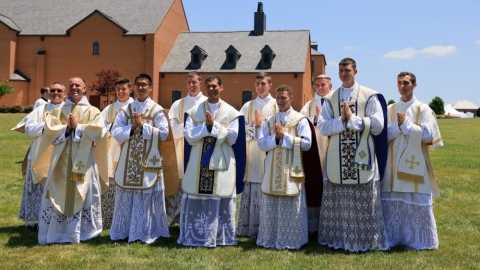Timeline of the Synodal Path

The synodal process in Germany is in the phase of implementing decisions voted on during the Synodal Assemblies, the last of which was held in March 2023. Perspective, since the launch of the Synodal Path in 2019, allows us to trace this movement which has plunged the German Church into a whirlwind that many observers don’t hesitate to call schismatic.
A Short Timeline of the Synodal Path
2014 Following moral scandals, the German episcopate orders interdisciplinary academic research at the universities of Mannheim, Heidelberg, and Gießen--under the name “MHG Study”--which went on from July 2014 to September 2018.
2018 Delivery of the MHG Study to the German Bishops’ Conference (DBK) during their fall meeting at Fulda (September).
March 2019 DBK meeting in Lingen in March, at the end of which Cardinal Marx announces the launch of the Synodal Path in collaboration with the Central Committee of German Catholics (ZdK). Four forums are created in order to prepare the documents that will be discussed in the assembly.
April 2019 Pope Emeritus Benedict XVI speaks out regarding the abuse crisis and implicitly criticizes the launch of the Synodal Path.
June 2019 Pope Francis sends the Letter to the Pilgrim People of God in Germany to encourage the German Synod and to criticize it in certain respects.
September 2019 The Roman Curia sharply criticizes the proposed Statutes of the Synodal Path. The letter receives a scathing response from Cardinal Reinhard Marx. The Plenary Assembly of the DBK in Fulda votes on the Statutes, which will also be voted on by the ZdK in November. The first draft of the working documents of each forum is presented to the bishops.
November 2019 The approved Statutes give the Synodal Assembly a distinctly secular profile: out of 227 designated members, 105 are clerics and 122 are laypeople, including 70 women. The President of the DBK and that of the ZdK are Co-presidents of the Synodal Path, and the Vice Presidents of both structures are associated with them.
December 2019 On the first Sunday of Advent (December 1), a meeting takes place in Frankfurt to address questions of organization and procedure.
January-February 2020 First Synodal Assembly in Frankfurt. 217 members present (of 230). Adoption of internal regulations. Discussion on the texts of the preparatory forums. Elections for the synodal forums which will be responsible for developing the texts to discuss and vote on.
September 2020 On the fourth of the month, regional conferences are organized in Berlin, Dortmund, Frankfurt, Ludwigshafen, and Munich, which will gather almost all the members, while awaiting the Second Synodal Assembly, postponed due to the pandemic. Discussion on the texts of the forums are held, the results of which will be incorporated in the proposals.
September-October 2021 Second Synodal Assembly in Frankfurt. Reading of the Preamble text and the Orientation text which name and explain the theological sources from which the Synodal Path must draw. It is a (re)questioning of theological “places.” First reading of various forum texts. Announcement of the replacement of the President and the Vice President from the ZdK.
February 2022 Third Synodal Assembly in Frankfurt. Decision to hold a supplementary assembly in March 2023. Adoption of the Orientation text; of the Foundational text of Forum I (“Power and separation of powers in the Church”), of the Implementation text on the “Involvement of the faithful in the appointment of the diocesan bishop”; of many Forum II texts (on priests) in the first reading; of many Forum III texts (“Women in ministries and offices in the Church”) in the first reading; and finally of many Forum IV texts (on sexuality) in the first reading.
September 2022 Fourth Synodal Assembly in Frankfurt. The first day is marked by a dramatic turn of events: a minority of bishops (acting as a kind of blockade) reject the fundamental Forum IV text on “renewed sexual ethics,” provoking chaos. It must be said that the document is particularly scandalous. It affirmed that “Same-sex sexuality--also expressed in sexual acts--is therefore not a sin that causes separation from God, and it is not to be judged as intrinsically bad. Homosexuality is not an exclusion criterion for access to ordained ministry.” Further on, the text recognizes onanism as a legitimate form of sexuality. It states that “Same-sex partnerships [...] should be able to see themselves as placed under the blessing of God, expressly granted by the Church, and live from it. This also applies to people who enter into a new partnership after a marriage has failed.” Some bishops affirm that they will implement this text, whether it is voted for or not.
The next day, approval for the second reading of a document which states: “In order to evolve the Church’s teaching through a re-evaluation of homosexuality, the Synodal Assembly turns to the Pope and recommends him to seek an understanding on this matter within the universal Church.” Then of a text which changes the rules of employment in the service of the Church: it opposes any sanction or discrimination in the hiring of divorced and remarried people or same-sex couples. Finally, the adoption of a Foundational text of Forum III on “Women in ministries and offices in the Church.”
On the third day, adoption in the second reading of a text which anticipates the creation of a “Synodal Council” which could take place on three levels: national, diocesan, parish. This Synodal Council is “an advisory and decision-making body” which “shall advise on major developments in the Church and in society and based on this shall take fundamental decisions of supra-diocesan significance on pastoral planning, future perspectives of the Church and financial and budgetary matters of the Church that are not decided at diocesan level.” In other words, this council supersedes the bishops. Three other Forum IV texts were adopted in the first reading: “Total acceptance of priests who are homosexual, bisexual, or of another non-heterosexual orientation”; “Dealing with gender diversity”; “Proclaming the Gospel through women in word and sacraments.”
March 2023 Fifth Synodal Assembly in Frankfurt. On the first day, adoption of a text on “Priestly existence today,” which has as its aim “Overcoming clericalism,” and of another text proposing to modify priestly celibacy.
On the second day, adoption of texts on the “Proclamation of the Gospel by authorized baptized and confirmed persons in word and sacrament”; then that of the establishment of Synodal Councils. The text on the celebration of “Blessing ceremonies for couples who love each other” was then adopted.
Finally, between the second and third days, texts would be adopted on “Prevention of sexualized violence,” on “Dealing with gender diversity”--understanding the question of gender--the text on “Women in sacramental ministries,” the Preamble text, and finally the putting in place of a Synodal Committee which must follow and implement the reform project in three years--in other words, a sort of continued Synod, before the holding of a sixth assembly. One of the principal tasks of the Synodal Committee will be putting in place Synodal Councils, knowing that the Roman Curia is opposed to these Councils at the national and diocesan level since January 2023. In all, 15 texts were voted on in the second reading and adopted.
List of texts voted on and adopted by the Synodal Path:
1) Preamble. Listen, learn, taking new ways: The Synodal Path of the Catholic Church in Germany (3/11/2023)
2) Orientation text. On the path of conversion and renewal. Theological foundations of the Synodal Path of the Catholic Church in Germany (2/3/2022)
Foundational texts (of the Forums):
3) Power and separation of powers in the Church-- Joint participation and involvement in the mission (Forum I. 2/3/2022)
4) Priestly existence today (Forum II. 2/3/2022)
5) Women in ministries and offices in the Church (Forum III. 9/9/2022)
[The foundational text of Forum IV was refused by the bishops.]
Implementation texts:
6) Involvement of the faithful in the appointment of the diocesan bishop (Forum I. 2/3/2022)
7) A re-evaluation of homosexuality in the Magisterium (Forum IV. 9/9/2022)
8) Fundamental Order of Ecclesial Ministry (Forum I. 9/9/2022)
9) Sustainable strengthening of Synodality: A Synodal Council for the Catholic Church in Germany (Forum I. 9/10/2022)
10) The celibacy of priests--strengthening and opening (Forum II. 3/9/2023)
11) Proclamation of the Gospel by authorised baptised and confirmed persons in word and sacrament (Forum I. 3/10/2023)
12) Blessing ceremonies for couples who love each other (Forum IV. 3/10/2023)
13) Prevention of sexualized violence, intervention and dealing with perpetrators and suspects in the Catholic Church (Forum I. 3/10/2023)
14) Dealing with gender diversity (Forum IV. 3/10/2023)
15) Women in sacramental ministries--Perspectives for the universal church dialogue (Forum III. 3/11/2023)
(Sources : synodaler weg/katholisch.de – FSSPX-Actualités)
Illustration : Photo 183588913 © Karinhamich | Dreamstime.com





